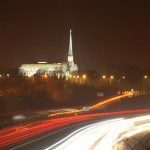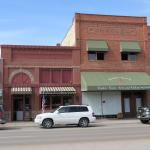
My wife and I will be heading in a couple of hours down to Cedar City, Utah, where we’ll be attending the wonderful Utah Shakespeare Festival, which is one of my adopted state’s priceless treasures. We’ve been attending the Festival annually for something on the order of thirty-five years — except, painfully, last year, when we simply weren’t in the country long enough to be able to pull it off. I deeply regretted that omission because, during my teaching career at Brigham Young University, attendance at the Festival was something of an end-of-summer ritual for us. It punctuated our year in a meaningful way.
I didn’t grow up in a family that cared about Shakespeare or such things more generally. It was when I went with a friend and his family to the Oregon Shakespeare Festival in Ashland, following my mission, that I resolved that I wanted to make that kind of thing a regular practice in my own family, if I could. (Marrying a theater major certainly eased my way into that family tradition! She harbored no objections at all.) We have thoroughly enjoyed our times at the Festival in Cedar City, and we’ve even made our way back up to Ashland once or twice. (I hope to do it again, sometime.)
Tonight, if all goes according to plan, we’ll be seeing William Shakespeare’s A Midsummer Night’s Dream, which puts me in mind of this 2014 column that I wrote for the Deseret News after a prior Festival production of the play:
Some skeptics, responding (rather defensively, I think) to the accounts given by the witnesses to the Book of Mormon, attempt to dismiss them by citing the fallibility of eyewitnesses and the unreliability of human memory. Not wishing to attack the honesty or the sanity of the witnesses — approaches not easily reconciled with the historical evidence — they still hope to neutralize the witnesses’ claims.
Both eyewitness errors and false memories are legitimate issues, of course, and scientific and scholarly data exist on each.
I do not believe, though, that either concern applies to the Book of Mormon witnesses. (I’m thinking aloud here, and would welcome thoughtful, serious responses.)
Yes, it’s true that eyewitnesses sometimes get things very wrong. A person mugged at gunpoint, for example, may well have been so focused on the gun that she failed to register her attacker’s face or, more dangerously, remembers it incorrectly.
And, yes, even less stressful memories can be fallible. Probably all of us have had the experience of discovering that something we clearly “remembered” didn’t actually occur at all the way we “recalled.” Moreover, the further back the memory lies, the more problematic it can become. With several matters from my childhood and early years, for instance, I’m not sure that I actually remember them or whether, instead, I simply remember what I was told about them. Do I really recall my grandmothers, neither of whom I saw very much and both of whom died when I was five, or am I merely remembering images from their photographs?
But these cases seem very different from that of the witnesses to the Book of Mormon.
For one thing, the critics’ skepticism of eyewitness testimony seems notably selective. I’m reasonably confident that, if they saw a neighbor kid climbing over their fence with prize peaches stolen from their tree or watched me vandalizing their car, they would have little doubt about what they had witnessed. Theoretical reservations about eyewitness testimony and the confusions of memory would likely seem rather silly to them under such circumstances. “I know what I saw!” they would (reasonably) insist.
Additionally, in the case of the witnesses, we’re considering people whose stories of their encounters with the plates — and, in the cases of Martin Harris, Oliver Cowdery and David Whitmer, with several other artifacts, as well as with an angel and the voice of God — were first told, and first reduced to writing, shortly after the encounters took place. These aren’t vague childhood recollections, dimly remembered after the passage of decades.
And there is the significant fact that their accounts agree. I look, here, to a fictional narrative from the last act of Shakespeare’s A Midsummer Night’s Dream. Theseus, the Duke of Athens, and his soon-to-be bride, Hippolyta, queen of the Amazons, are discussing the amazing story of mix-ups and enchantments in the forest just outside the city that they have just heard from two young Athenian couples (Hermia and Lysander, Helena and Demetrius).
“Tis strange my Theseus,” observes Hippolyta, “that these lovers speak of.”
But the skeptical duke credits none of it. He replies, “More strange than true. I never may believe these antique fables, nor these fairy toys. Lovers and madmen have such seething brains, such shaping fantasies, that apprehend more than cool reason ever comprehends. The lunatic, the lover and the poet are of imagination all compact.”
They were probably just mistaken, he suggests: “In the night, imagining some fear, how easy is a bush supposed a bear!”
Hippolyta, on the other hand, has been impressed by the consistency of the accounts given by the four young people — which, the audience happens to know, are true (within the overall fiction of Shakespeare’s story):
“But all the story of the night told over, and all their minds transfigured so together, more witnesseth than fancy’s images and grows to something of great constancy.”
And that’s among the most impressive aspects of the witness accounts, as well.
Had thousands, hundreds or even dozens of people been given the opportunity to see and “heft” the plates, and had only eleven of them later claimed to have done so, one might respond that, naturally, a large group will always include a few who were confused or have faulty memories.
In the case of the Book of Mormon witnesses, however, all who had the opportunity to see or to touch did, in fact, see or touch, and all of them told the same story until they died.
I’m looking forward to the play tonight. My friend, who years ago introduced me to the very idea of a Shakespeare festival and with whom we intend to visit in Cedar City where he now lives, tells me that the “Helena” in the Festival’s production of Midsummer Night’s Dream this year may be the best he’s ever seen.












